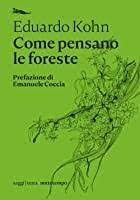Tag Archives: micro-representations
How Forests Think 2022 Best

This assignment involves writing an open letter of 3-4 pages, using our chapter from Eduardo Kohn’s How Forests Think: Toward an Anthropology Beyond the Human to look at the plight of other species and the humans trying to save them in Louie Psihoyos’ T
How Forests Think
Seeing Animals at a Time of Extinction and Captivity: A Letter. Please write an open letter of 3-4 pages, using our chapter from Eduardo Kohn’s How Forests Think: Toward an Anthropology Beyond the Human to look at the plight of other species and the humans trying to save them in Louie Psihoyos’ The Cove, Orlando von Einsiedel’s Virunga, and Lu Chuan’s Kekexili: Mountain Patrol. Please use all four (4) of these sources and, building on the great work you’ve done all term, try to dive into specific moments and detailed scenes to write about the stories inside them.
How Forests Think
Logistics: Your letter can be “open” in the sense you address it to a general public; as such, it can be less formal than your strictly academic prose you have cultivated so well this term. But please still cite your sources and include a “Works Cited” at the end. And please include a representation of the excerpt we have read from How Forests Think, along with micro-representations (they can be a few sentences) of The Cove, Virunga, and Kekexili. Take your scenes one at a time, so you give yourself a chance to look at them closely, and you can try building your individual paragraphs around those scenes. https://youtu.be/Ynl9XwwKUZ8
How Forests Think
But please organize the letter however it feels right to you—no need to start with your representation, though you can! And though links between what you are discovering in the discrete scenes from the different movies will allow your readers to understand your threads of connection, don’t feel a need to let one single, macro-argument take over—you can allow different dynamics and situations to flow through your letter so we get a sense of the varied elements working together in the fate of non-human animals, and in the human lives dedicated to them.






